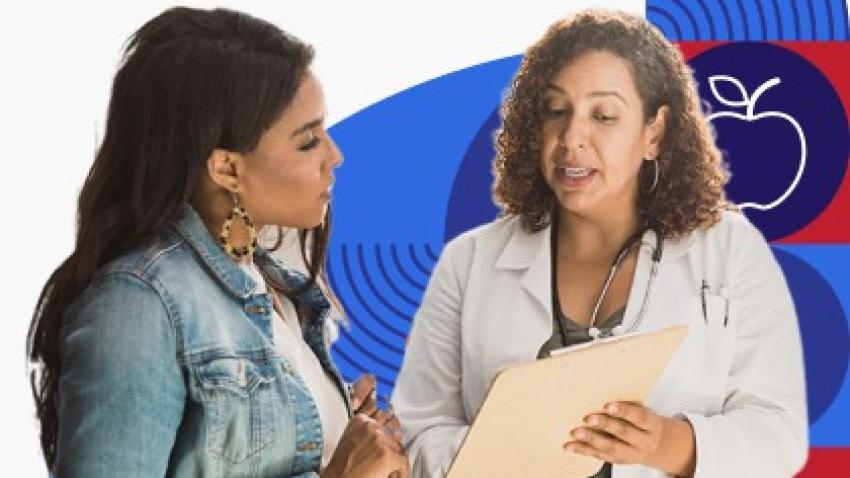Health Conditions
Get Tested for Chlamydia and Gonorrhea

The Basics
Overview
Chlamydia and gonorrhea are sexually transmitted infections (STIs), also called sexually transmitted diseases (STDs), that you can get during vaginal, anal, or oral sex. A pregnant person can also pass these STIs to their baby during birth.
How do I know if I have an STI?
Getting tested is the only way to know for sure if you have an STI. Most people who have an STI don’t feel sick or have any symptoms.
It’s also important to talk with a doctor or nurse if someone you recently had sex with has an STI.
Is there a cure for chlamydia and gonorrhea?
Chlamydia and gonorrhea can both be cured with the right treatment. If these STIs aren’t treated, they can cause serious health problems, like making it difficult or impossible to get pregnant.
If you have an STI, it’s important to get treatment right away. It’s also important to tell any sex partners you have about your STI so they can get treated, too. This can help protect others from getting an infection and protect you from getting the infection again.
It’s a good idea to get tested again 3 months after you finish treatment. That’s because getting chlamydia and gonorrhea again is common.
Who Needs Testing?
Who needs to get tested for chlamydia and gonorrhea?
Women are more likely than men to have serious health problems from untreated chlamydia and gonorrhea, and the recommendations for getting tested are different for women and men:
For women:
- If you're age 24 years or younger and having sex, get tested once every year
- If you're age 25 years or older, get tested every year if you're at higher risk for infection
For example, you may be at higher risk if you have:
- More than 1 sex partner
- A new sex partner
- A sex partner with an STI
For men:
- Talk with a doctor to find out if you need to get tested for chlamydia, gonorrhea, or other STIs
If you’re transgender, or if you don’t identify as a woman or a man, talk to your doctor about your testing needs.
Learn more about getting tested for STIs.
If you’re sexually active, it’s a good idea to have an honest talk with your doctor or nurse about your sexual activity. The information you share with them, along with STI screening recommendations, will help them figure out if you need to get tested for chlamydia, gonorrhea, or any other STIs.
Use this tool to find out which STI tests you might need.
What are the signs of chlamydia or gonorrhea?
Many people who have chlamydia or gonorrhea don’t have any signs or symptoms. But symptoms for chlamydia and gonorrhea are very similar when they do happen.
Women with symptoms may have:
- Abnormal discharge (fluid) from the vagina
- Pain or burning when they urinate (pee)
- Bleeding between periods
Men with symptoms may have:
- Abnormal discharge from the penis
- Burning when they urinate
- Painful or swollen testicles (though this symptom is less common)
People can also have an infection in their rectum (the part of the body that connects the colon to the anus). This doesn’t always cause symptoms. But when symptoms do happen, they can include:
- Discharge or bleeding from the anus
- Itching or soreness around the anus
- Painful bowel movements (pain when pooping)
See a doctor or nurse if you or your partner notice any of these symptoms.
What to Expect
How do doctors test for chlamydia and gonorrhea?
A doctor or nurse can test your urine for both chlamydia and gonorrhea. Sometimes, the doctor might take a sample from the vagina, penis, rectum, or throat instead. The test is easy and painless.
Learn more about chlamydia:
Learn more about gonorrhea:
Take Action
Get Tested
Get tested for chlamydia and gonorrhea if you're at risk, if you or a partner has any STI symptoms, or if your partner has an STI. Talk with any sex partners you have about getting tested, too.
Make an appointment at a health center or clinic.
If you think you may be at risk, talk with your doctor about getting tested for chlamydia and gonorrhea. Be sure to ask about getting tested for HIV, too.
To find an STI clinic near you:
- Enter your ZIP code to find a local testing site
- Call 800-CDC-INFO (800-232-4636)
What about cost?
Under the Affordable Care Act, insurance plans must cover some STI testing and prevention counseling. Depending on your insurance plan, you may be able to get these services at no cost to you. Talk to your insurance company to find out more.
Medicare may also cover some STI testing and counseling at no cost for people who are at risk. Learn about Medicare coverage for STI testing and counseling.
If you don’t have insurance, you may still be able to get free or low-cost STI testing. Use this resource to find free testing near you.
To learn more, check out these resources about:
Protect Yourself
Stay safe.
The most reliable way to protect yourself from STIs is to not have vaginal, anal, or oral sex. Wait to have sex until you and any sex partners have tested negative for STIs.
Here are some other ways to protect yourself from STIs:
- Use a condom the right way every time you have vaginal, anal, or oral sex, and leave it on from start to finish
- Make sure you and any sex partners have been tested for STIs
- If you know that you or a sex partner has an STI, get treated before having sex
Use these resources to:
- Learn how to use a condom the right way
- Get tips on talking with your partner about STI testing
- Learn what to do if you test positive for gonorrhea or chlamydia
If you're pregnant, talk with your doctor about STI testing.
Having chlamydia, gonorrhea, or another STI while you're pregnant can be very dangerous for you and your baby. Find out more about STIs and pregnancy.
Content last updated January 19, 2024
Reviewer Information
This information on getting tested for sexually transmitted diseases was adapted from materials from the Centers for Disease Control and Prevention.
Reviewed by:
Salina Smith
Health Communications Specialist
Division of STD Prevention
Centers for Disease Control and Prevention


